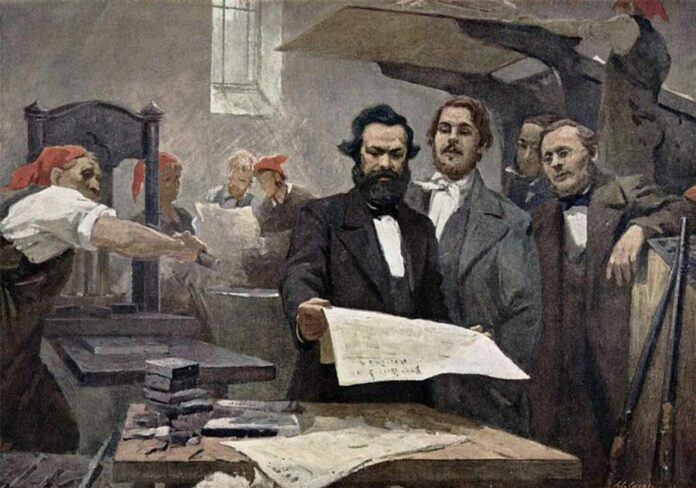
Anmeldelser og debat om marxistiske bøger og den globale finanskrise og kapitalismen. / Reviews and debate on Marxist books on the global financial crisis and capitalism.
Se også på Modkraft.dk:
- Bøger om krisen (1): Europa. Af Anders Lundkvist (7. januar 2013)
- Bøger om krisen (2): USA. Af Anders Lundkvist (9. januar 2013)
Se også på Socialistisk Bibliotek
- Emneoversigt: Marxisme / Marxism
- Emneoversigt: Økonomi / Economy
- Linkbox: Karl Marx’ The Capital, theories of crisis and Marxist economy
- Linkbox: Kapitalismen i krise (2) 2009-
- Linkbox: Kapitalismen i krise (1) 2008
- Linkbox: Neoliberalisme
Marxist books on economic crises
Albo, Greg
In and Out of Crisis: The Global Financial Meltdown and Left Alternatives
By Greg Albo, Sam Gindin and Leo Panitch (Oakland, CA, PM Press, 2010, 144 pages)
“In this groundbreaking analysis of the meltdown, renowned radical political economists Albo, Gindin and Panitch lay bare the roots of the crisis, which they locate in the dynamic expansion of capital on a global scale over the last quarter century – and in the inner logic of capitalism itself.”
See:
- An interview with Leo Panitch, Sam Gindin and Greg Albo, by Sasha Lilley (In and Out of Crisis, September 26, 2010)
- Capitalist crisis and left alternatives. Review by Hamid Sodeifi (New Socialist, 15 November 2010)
- An intelligent take on the economic crisis. Review by Graham Balmer (Permanent Revolution, 27 September 2010; online at PM Press)
- Hvordan man genopbygger venstrefløjen i en krisetid + 2. del. Interview med Leo Panitch (Kritisk Debat, 15. april + 15. juni 2011; online på Internet Archive)
Brooks, Mick
Capitalist Crisis: Theory and Practice: A Marxist Analysis of the Great Recession 2007-11
(Expedia, 2012, 267 pages)
“This book takes us on journey, using the Marxist method, from the past to the present and into the future. It discusses possiblle opportunities and pitfalls that lie ahead. Ho much has this mess cos us so far? Is this an unprecedented type of financial crisis? Or is it a classic crisis of capitalism? … Above all, we investigate whether Karl Marx got it right with his theory of capitalist crisis, as well as also touching on other debates within the international socialist left.”
See:
- The book’s site (Capitalistcrisis.wordpress.com)
- Review by Michael Roberts (Blogging from a Marxist economist, August 20, 2012)
Callinicos, Alex
Bonfire of Illusions: The Twin Crises of the Liberal World
(Cambridge, Polity Press, 2010, 179 pages)
“Alex Callinicos traces the credit crunch that developed in 2007-8 to a much more protracted crisis of overaccumulation and profitability that has gripped global capitalism since the late 1960s. He also confronts the interaction between economic and geopolitical events, highlighting the new assertiveness of nation-states and analysing the tense, complex relationship of interdependence and conflict that binds together the US and China.”
See:
- Review by Gonzalo Pozo (Socialist Worker, No.2211, 24 July 2010)
- Stoking the bonfire of illusions. Review by Jane Hardy (Socialist Review, Issue 346, April 2010)
- Alex Callinicos on imperialism, two reviews. By Barry Healy (Links, October 2, 2010). Scroll down.
- A fiery polemic. Review by Gareth Dale (International Socialism, No.128, Autumn 2010)
- Theories of late capitalist development: Harvey and Callinicos on contemporary imperialism. By Luke Cooper (Fifth International, Vol.3, No.4, 2010)
Carchedi, Guglielmo
Behind the Crisis: Marx’s Dialectics of Value and Knowledge
(Leiden, Brill, 2011, 303 pages)
“Much has been written since Capital was first published, and more recently after the demise of the Soviet Union and the consequent triumph of neoliberalism, about the irrelevance, inconsistency, and obsoleteness of Marx. This has been attributed to his unworkable method of inquiry. This book goes against the current.”
See:
- The book online (pdf) (Digamo.free.fr)
- Behind and beyond the crisis. By Guglielmo Carchedi (International Socialism, Issue 132, Autumn 2011, p.121-155)
- The return from the grave, or Marx and the present crisis. By G. Carchedi (Radical Perspectives on the Crisis, March 12, 2009)
- What drives capital’s global crises? Review by Mike Macnair (Weekly Worker, Issue 963, May 23, 2013) + Method and the dialectic (Issue 964, May 30, 2013)
- Carchedi, Foster and the causes of crisis. By Michael Roberts (Michael Roberts Blog, July 3, 2011)
Duménil, Gerard
The Crisis of Neoliberalism
By Gerard Duménil and Dominique Lévy (Harvard, Harvard University Press, 2011, 400 pages). See Contents.
“This book examines ‘the great contraction’ of 2007–2010 within the context of the neoliberal globalization that began in the early 1980s. This new phase of capitalism greatly enriched the top 5 percent of Americans, including capitalists and financial managers, but at a significant cost to the country as a whole.”
See:
- The book online (pdf) (Digamo.free.fr)
- Gerard Duménil and Dominique Lévy’s site
- Systemic failures. Review by Gabriele Piazza (International Socialism, Issue 132, Autumn 2011)
- Review by Jenny Morrison (International Socialist Group, 31 October 2011)
- Swans and Zombies: Neoliberalism’s permanent contradiction. Review by Joshua Clover (The Nation, April 25, 2011)
- The crisis of neoliberalism and Gerard Dumenil (Michael Roberts blog, March 3, 2011)
Foster, John Bellamy
The Endless Crisis: How Monopoly-Finance Capital Produces Stagnation and Upheaval from the USA to China
By John Bellamy Foster and Robert W. McChesney (New York, Monthly Review Press, 2013, 227 pages)
“This incisive and timely book traces the origins of economic stagnation and explains what it means for a clear understanding of our current situation … It appears that the Great Recession has given way to a period of long-term anemic growth.”
See:
- The endless crisis. By John Bellamy Foster and Robert W. McChesney (Monthly Review, Vol.64, No.1, May 2012, p.1-28). The book’s introduction.
- The lost decades’ of a moribund Capitalism. Review by Philip Louro (New Politics, Issue 55, Summer 2013)
- Review by Ben Kohler (Green Left Weekly, Issue 963, April 30, 2013)
- Review by Peter Stauber (Counterfire, 20 April 2013)
- Review by Hans G Despain (Marx & Philosophy Review of Books, 30 January 2013)
Foster, John Bellamy
The Great Financial Crisis: Causes and Consequences
By John Bellamy Foster and Fred Magdoff (New York, Monthly Review Press, 2009, 160 pages)
“[The author’s] argue that this latest financial crash, although greater than any since 1929, is itself a symptom of deeper problems connected to the stagnation of the “real” or productive economy of mature capitalism. Financial bubbles have become the chief means of countering stagnation, but these inevitably burst, bringing the underlying economic problems back to the surface.”
See:
- Review by Joseph Choonara (Socialist Review, Issue 334, March 2009)
- A handbook for the downturn. Review by Graham Matthews (Green Left Weekly, No.790, 04.05.2009)
- The crisis and its roots. Review by Petrino DiLeo (International Socialist Review, No.66, July-August 2009)
- Review by Patrick Bond (Links, April 2009)
- The great financial crisis – three years on. By John Bellamy Foster and Fred Magdoff (Monthly Review, Vol.62, No.5, October 2010)
Gindin, Sam
The Making of Global Capitalism: The Political Economy of American Empire
By Sam Gindin and Leo Panitch (Verso, 2013, 464 pages)
“In this groundbreaking work, Leo Panitch and Sam Gindin demonstrate the intimate relationship between modern capitalism and the American state.”
See:
- The book online (pdf) (Digamo.free.fr)
- Global capitalism and the left (New Left Project, 20 December, 2012). Interview with Leo Panitch.
- Debating imperialism. Review by Adrian Budd (International Socialism, Issue 144, Autumn 2014)
- Global empire or imperialism? Review by Ashley Smith (International Socialist Review, Issue 92, Spring 2014)
- Review by Paul Hampton (Workers’ Liberty, 29 December, 2013)
- Forging the capital security state. Review by Allen Ruff (Against the Current, Issue 167, November-December 2013)
- Why the state matters and the USA still dominates capitalism worldwide. Review by Dave Kellaway (Socialist Resistance, November 3, 2013)
- Global capitalism and the state (New Left Project, June 2013). Debates and reviews by Jeremy Green, Bastiaan van Apeldoorn/ Naná de Graaff, Göran Therborn, Bob Jessop and Sam Gindin/Leo Panitch.
- Jacobin Book Club Seminar: The Making of Global Capitalism. By Mike Beggs (Jacobin, July 1, 2013). With links to articles by Nicole Aschoff, Henry Farrell, Elizabeth Humphrys, Göran Therborn, Dick Bryan & Mike Rafferty, Mike Beggs and Martijn Konings.
- The making and unmaking of global capitalism (Jacobin, July 30, 2013). Leo Panitch & Sam Gindin respond to the debate at the seminar on their book.
See also: - Underestimating evidence, capitalists and workers: A rejoinder to Sam Gindin. By Andrew Kliman (New Left Project, 19 May 2014). With links to articles by Sam Gindin (2 January) + Andrew Kliman (3 March) + Sam Gindin (17 March)
- Financialization and profitability. By Barry Finger (New Left Project, 19 March 2014)
- Sam Gindin and ‘the cause of every crisis is different’ (Michael Roberts Blog, March 19, 2014)
- The informal empire, finance and the mono cause of the Anglo-Saxons (Michael Roberts Blog, November 12, 2013)
Harman, Chris
Zombie Capitalism: Global Crisis and the Relevance of Marx
(London, Bookmarks, 2009, 424 pages)
“Chris Harman shows how Marx’s understanding of capitalism is essential for any explanation of how this world emerged and developed over the last century and a half. He shows that the roots of the crisis today lie not in financial speculation but much deeper in a crisis of profitability which 30 years of the neoliberal offensive have failed to reverse.”
See:
- The book online (pdf) (Digamo.free.fr)
- Interview with Chris Harman about the book (Socialist Worker, No.2157, 27 June 2009)
- Pinning the blame on the system. Review by Andrew Kliman (International Socialism, No.124, Autumn 2009)
- Zombie Capitalism and the origin of crises. Review by Guglielmo Carchedi (International Socialism, No.125, Winter 2010)
- What are the roots of capitalist crisis? Review by Lee Sustar (International Socialist Review, No.77, May-June 2011)
- Linkbox: Chris Harman’s ’Zombie Capitalism’ (Socialistisk Bibliotek)
Harvey, David
The Enigma of Capital: And the Crises of Capitalism
(London, Profile Books, 2010, 296 pages)
“Radical sociologist David Harvey explains how capitalism came to dominate the world, why it resulted in the current financial crisis – and why it’s time for a change.”
See:
- The book online at Libcom.org
- David Harvey’s site (DavidHarvey.org)
- Om David Harvey – en introduktion (pdf). Af Rolf Czeskleba-Dupont og Peter Schultz Jørgensen (RUC, 2015, 9 s.)
- ”Jeg kalder denne nye samfundskritiske generation ’den fritænkende venstrefløj’…” + “Vi må finde nogle mere slagkraftige løsninger” (Autonom Inforservice, 13. maj + 29. maj 2015). Interview med David Harvey.
- Det sidste marked er udtømt. Af Peter Schultz Jørgensen (Information.dk, 10. maj 2014). Interview med David Harvey.
- Explaining the crisis. A interview with David Harvey (International Socialist Review, No.73, September-October 2010). Interview with David Harvey.
- Review by Matthew Brett (Socialist Studies, Vol. 8, No.1, Winter 2012)
- The Enigma of the Enigma – my critique of David Harvey for the Left Forum. By Andrew Kliman (Kapitalism101, March 10, 2012)
- Decoding capitalism. Review by Joseph Choonara (International Socialism, Issue 129, Winter 2011)
- David Harvey, Marx’s method and the enigma of surplus (Michael Roberts Blog, November 13, 2011)
- How much is too much? Review by Benjamin Kunkel (London Review of Books, Vol.33, No.3, February 2011)
- A system doomed to crisis. Review by Bill Mullen (SocialistWorker.org, November 11, 2010)
- Review by Ed Rooksby (Marx & Philosophy Review of Books, 18 November 2010)
See also: - David Harvey: A Critical Reader (pdf). Edited by Noel Castree and Derek Gregory (Blackwell, 2006, 317 p.). David Harvey: List of Publications (p.295-302)
- Linkboxen David Harvey og kapitalismen (Socialistisk Biblioteket)
Kliman, Andrew
The Failure of Capitalist Production: Underlying Causes of the Great Recession
(London, Pluto Press, 2011, 240 pages)
“The recent financial crisis and Great Recession have been analysed endlessly in the mainstream and academia, but this is the first book to conclude, on the basis of in-depth analyses of official US data, that Marx’s crisis theory can explain these events.”
See:
- The book online (Libcom.org)
- Synopsis of the book & excerpts from the introduction (Marxist-Humanist Initiative/With Sober Senses)
- Andrew Kliman’s site
- Debate on economic crisis erupts in the CWI: start of much-needed rethinking on the left? (Marxist Humanist Initiative, November 4, 2013). With links to the debate.
- Crisis, theory and politics (Weekly Worker, Issue 931, September 27, 2012). Nick Rogers interviews Andrew Kliman.
- A Marx for our times. Review by Ravi Bali (A World to Win, 20 March 2013)
- Review by Matthew Wood (Marx & Philosophy Review of Books, 30 January 2013). See Reply by Andrew Kliman (With Sober Senses, February 6, 2013)
- Value, profit and crisis. Review by Nick Rogers (Weekly Worker, Issue 921, July 5, 2012)
- After the fall. Review by Gabriele Piazza (International Socialism, Issue 134, Spring 2012)
- The number of the beast. Review by Tony Norfield (Economics of Imperialism, 13 March 2012)
- Andrew Kliman and The Failure of Capitalist Production (Michael Roberts’ Blog, December 8, 2011)
- The Persistent Fall in Profitability Underlying the Current Crisis: New Temporalist Evidence. By Andrew Kliman (Marxist-Humanist Initiative, 2010, 90 pages). Draft online at Andrew Kliman’s site
- Kriser løses ved destruktion af kapital. Af Andrew Kliman (Modkraft.dk/Kontradoxa, 31.oktober 2009)
- ‘The destruction of capital’ and the current economic crisis. By Andrew Kliman (Socialism and Democracy, Vol.23, No.2, July 2009)
- Reclaiming Marx’s Capital: A Refutation of the Myth of Inconsistency. By Andrew Kliman (Lexington Books, 2007). See review by Michael Roberts (In Defence of Marxism, 19 July 2007)
Lapavitsas, Costas
Profiting Without Producing: How Finance Exploits Us All
(London, Verso, 2014, 352 pages)
“[The book] defines financialization in terms of the fundamental conduct of non-financial enterprises, banks and households. Its most prominent feature is the rise of financial profit, in part extracted directly from households through financial expropriation.”
See:
- Costas Lapavitsas (Blog). See here about the book
- Finanssektormentalitet. Af Costas Lapavitsas (Information.dk, 6. januar 2014)
- Finance and the “other exploitation”. Review by Martin Thomas (Workers’ Liberty, 1 January 2015)
- Financial times. Review by Joseph Choonara (International Socialism, Issue 142, Spring 2014)
- Review by Hans G Despain (Marxist & Philosophy Review of Books, 13 February 2014)
- Review by Orlando Hill (Counterfire, 1 February 2014)
- Capitalist production good, capitalist finance bad. By Tony Norfield (Economics of Imperialism, 6 January 2014)
- Costas Lapavitsas interview: the credit crunch (International Socialism, Issue 117, Winter 2008)
- A financial or economic crisis? (Michael Roberts Blog, June 15, 2010)
McNally, David
Global Slump: The Economics and Politics of Crisis and Resistance
(Oakland, CA, PM Press, 2011, 230 pages)
“Global Slump analyzes the global financial meltdown as the first systemic crisis of the neoliberal stage of capitalism. It argues that – far from having ended – the crisis has ushered in a whole period of worldwide economic and political turbulence. In developing an account of the crisis as rooted in fundamental features of capitalism, Global Slump challenges the view that its source lies in financial deregulation.”
See:
- David McNally’s site (Davidmcnally.org)
- The continuing global slump. By David McNally (New Socialist, 24 November 2012). Afterword to the Danish translation of the author’s book Global Slump. In Danish: Årets bedste krisebog (Shegn.blogspot.dk, 23. december 2012)
- Slump, austerity and resistance (pdf). By David McNally (Socialist Register 2012, p.36-63; online at Michael Roberts Blog)
- To interpret the world and to change it (pdf) (Socialist Studies, Vol.7, No.1-2, Spring-Fall 2011, p.1-36). Interview with David McNally.
- The mutating crisis of global capitalism. By David McNally (International Socialist Review, No.73, September-October 2010)
- From financial crisis to world-slump: accumulation, financialisation, and the global slowdown (pdf). By David McNally (Historical Materialism, Vol.17, No.2, 2009, p.35-83; online at Havens Center, University of Wisconsin)
- Dagens arbeiderklasse, krise og muligheter for motstand (Rødt!/Gnist, nr.1, 2013, s.88-93). Et intervju med David McNally.
- Nyliberalismens fallit og den globale recession. Anmeldelse af Anders Hadberg (Solidaritet, nr.1, marts 2013, s.34-37). P.t. ikke online
- David McNallys bog ‘Den globale krise’ (Socialistisk Bibliotek). Linkbox med anmeldelser og debat om bogen (nu i dansk udgave), samt materiale af/med forfatteren, hovedsageligt engelsksproget.
Magdoff, Fred
The ABCs of the Economic Crisis: What Working People Need to Know
By Fred Magdoff and Michael D. Yates (New York, Monthly Review Press, 2009, 144 pages)
“This short, clear, and concise book explain the nature of the economic crisis. Contrary to conventional wisdom, the authors demonstrate that this crisis is not some aberration from a normally benign capitalism but rather the normal and even expected outcome of a thoroughly irrational and destructive system … This book is aimed primarily at working people, students, and activists.”
See:
- Chapter 1 + 2 of the book online (pdf) (Reading from the Left)
- A crisis made by neoliberalism. Interview with Michael Yates and Fred Magdoff (SocialistWorker.org, November 10, 2009)
- The great recession and its aftermath: causes vs. symptoms. By Fred Magdoff (MR Online, 6 February 2011)
Mattick [Jr.], Paul
Business as Usual: The Economic Crisis and the Failure of Capitalism
(London, Reaktion Books, 2011, 126 pages)
“Paul Mattick explains the recession in jargon-free style, without shying away from serious analysis. He explores current events in relation to the development of the world economy since the Second World War and, more fundamentally, looks at the cycle of crisis and recovery that has characterized capitalism since the early nineteenth century. Mattick situates today’s crisis in the context of a capitalism ruled by a voracious quest for profit.”
See:
- Extracts from the book: Capitalism’s dismal future (Libcom.org)
- Marxism without Marx. Review by Gary Roth (Insurgent Notes, Issue 6, June 2012)
- Goodbye, Mr. Keynes? Review by Jason Schulman (New Politics, March 25, 2012)
- Clear economics, weak politics. Review by Mike Macnair (Weekly Worker, Issue 902, February 23, 2012)
- Crisis: the stories so far. Review by Stuart Watkins (Socialist Standard, May 2011)
Roberts, Michael
The Long Depression: How it Happened, Why it Happened and What Happens Next
(Chicago, Illinois, Haymarket Books, 2016, 347 pages)
“Setting out from an unapologetic Marxist perspective, The Long Depression argues that the global economy remains in the throes of a depression. Making the case that the profitability of capital is too low, and the debt built up before the Great Recession too high, leading radical economist Michael Roberts persuasively presents his case that this depression will persist until the profitability of capital is restored through yet another slump.”
See:
- Michael Roberts og den faldende profitrate. Af Karen Helveg Petersen (Solidaritet.dk, 13. december 2019).
- Michael Roberts Blog: blogging from a marxist economist
- Den lange depresjonen. Anmeldelse af Torstein Dahle (Rødt!: Marxistisk Tidsskrift, nr.3, 2016)
- Med profitraten på eventyr. Anmeldelse af Søren Mau (Information/Moderne Tider, 8. oktober 2016). Kun online for abonnenter.
- Explaining the Crisis. Review by Jack Rasmus (International Socialist Review, Issue 105, Summer 2017, p.162-167)
- Review by Dominic Alexander (Counterfire, June 29, 2017)
- System of a down. Review by Dave Sewell (International Socialism, Issue 154, Spring 2017, p.209-213). See also Nick Moore:The long depression: a discussion (Issue 155, Summer 2017, p.201-05)
- Marxist theory and the Long Depression (Historical Materialism, Blog, 3 December 2016). “Pete Green on Michael Roberts’ The Long Depression.”
- Debating the rate of profit (Historical Materialism, Blog, 20 November 2016). “Panel on Michael Roberts’ The Long Depression.”
- Michael Roberts on US profit rates: A critique and an alternative view (Historical Materialism, Blog, 20 November 2016). “Jim Kincaid on Michael Roberts.”
- The Long Depression. Review by Mark Krantz (Socialist Review, Issue 418, November 2016)
- Is Capitalism past its sell-by date? Review by Jock (The Internationalists, October 31, 2016)
- A guide to the shallow ups and deeper downs. Review by Neil Loehlein (SocialistWorker.org, October 20, 2016)
- Cycles in capitalism – a critique of The Long Depression (Michael Roberts Blog, June 7, 2017)
- The profitability of crises (Michael Roberts Blog, June 19, 2017). “Interview on the basic themes of my book.”
- The Long Depression – an interview (Michael Roberts Blog, August 2, 2016). “Mark Kilian talked to me about my new book …”. Svensk udgave: Den lange depresjonen (Gnist/Rödt, nr.4, 2016).
- The Long Depression and the future of capitalism (Left Voice, April 18, 2016). “In this interview with Marxist economist Michael Roberts, he discusses the concepts in his new book …”
- The global crawl continues. By Michael Roberts (International Socialism, Issue 147, Summer 2015, p.45-74)
- Revisiting a world rate of profit (pdf) (Michael Roberts Blog, July 2015, 12 p.)
- From global slump to long depression. By Michael Roberts (International Socialism, Issue 140, Autumn 2013, p.17-41)
- The causes of the Great Recession: mainstream and heterodox interpretations and the cherry pickers (pdf) (Michael Roberts Blog, September 2010, 34 p.)
- The Great Recession: Profit Cycles, Economic Crisis: A Marxist View (pdf). By Michael Roberts (Lulu, 2009, 322 pages; online at Libcom.org)
Shaikh, Anwar
Capitalism: Competition, Conflict, Crises
(Oxford, Oxford University Press, 2016, 1024 pages)
“It is an attempt to derive economic theory from the real world and then apply it to real problems. Shaikh applies Marxist categories and theory to all the major economic issues, including those that are supposed to be the province of mainstream economics, like supply and demand, relative prices in goods and services, interest rates, financial asset prices and technological change.”
See:
- The New School for Social Research (Anwarshaikhecon.org). With many articles online by Anwar Shaikh.
- Order in and through disorder (pdf). Chapter in: Eminent Economist II: The Life and Works Philosophies. Ed. Michael Azerberg and Lall B. Rambrattan (Cambridge University Press, 2014, p. 338-351). Biography of Anwar Shaikh.
- Capitalism and Anwar Shaikh (Michael Roberts Blog, April 4. 2016). “The most important book on Marxist economics this year”.
Smith, E.G.
Twilight Capitalism: Karl Marx and the Decay of the Profit System
By E.G. Smith, Jonah Butovsky and Joseph Watterton (Black Point, Nova Scotia, Fernwood Publishing, 2021, 295 pages). With Contents and Appendices.
“Twilight Capitalism offers a wide-ranging analysis of the origins, implications and scope of the “combined” social crisis of 2020 and beyond. A compelling case is made that Karl Marx’s critical analysis of capitalism, along with his program of class-struggle socialism, is essential to understanding and addressing the most important social, economic and ecological problems of our time.”
See:
- Twilight capitalism (Michael Roberts Blog, 8 November 2021). “… the best book on Marxist political economy in 2021 … these Canadian-based Marxist economists have delivered a comprehensive and often original analysis of global capitalism in the 21st century.”
Socialist Register 2012: The Crisis and the Left
Edited by Leo Panitch, Greg Albo and Vivek Chibber (Socialist Register, Merlin, 2011, 320 pages). With Table of Contents + Abstract.
“This volume was conceived as a companion to last year’s volume on ‘The Crisis This Time’ [and] deepens that analysis in range a ways, not only in terms of broader regional coverage that extends from Latin America to the Middle East to China to Europe, but also by probing the place of the city in capitalist crises, and the new accumulation strategies that feed on both the public sector crisis and the climate crisis, while still portending a new age of austerity. It also takes better measure of the state of the Left in the crisis, not least by a way of a symposium of three essays on what the Left’s response should be to the Eurozone crisis.”
See:
- Leo Panitch, Gregory Albo and Vivek Chibber: Preface
- Melting into air?. Review by Sheila Cohen (Against the Current, Issue 158, May/June 2012)
- Review by Bill Jefferies (Marx & Philosophy Review of Books, 2 April 2012)
- Crisis as capitalist opportunity (New Left Project, 7 December 2011). Interview with Ursula Huws about her contribution to SR 2012.
- Class and capitalism in the Gulf: the political economy of the GCC (New Left Project, 5 December, 2011). Interview with Adam Hanieh about his contribution to SR 2012.
Socialist Register 2011: The Crisis This Time
Edited by Leo Panitch, Greg Albo and Vivek Chibber (Socialist Register, Merlin, 2010, 296 pages). With Table of Contents + Abstract.
“The themes this volume encompasses include: Putting ”˜the crisis this time’ in historical and theoretical perspective; Analyzing the role of banks and derivatives in global financialization; Iterrogating Wall Street and City of London before and after the crisis; Surveying the crisis in the USA, the UK, Europe, Japan and South Africa; Taking the measure of the impact of the crisis on working class families; Showing how ”˜exit strategies’ are reviving neoliberalism; Surveying the struggles against the new public austerity in Greece, Ireland, UK and USA.”
Some of the chapters from the yearbook online:
- Leo Panitch, Gregory Albo and Vivek Chibber: Preface (Socialist Register)
- Leo Panitch and Sam Gindin: Capitalist crises and the crisis this time (pdf) (Socialist Project)
- Anwar Shaikh: The first great depression of the 21st century (The New School for Social Research)
- Johanna Brenner: Caught in the whirlwind: US working-class families face the economic crisis (New Socialist)
- R. Taggart Murphy: A loyal retainer? Japan, capitalism, and the perpetuation of American hegemony (The Asia-Pacific Journal)
- Riccardo Bellofiore, Francesco Garibaoldo and Joseph Halevi: The global crisis and the crisis of European neomercantalism (pdf) (Gesd.free.fr)
- Noam Chomsky: The center cannot hold: Rekindling the radical imagination (ZNet)
See: - Once more (with feeling) on Marxist accounts of the crisis. Review by Joseph Choonara (International Socialism, Issue 132, Autumn 2011)
- Crisis and class struggle (pdf). Review by Pratyush Chandra (Economic & Political Weekly, Vol.46, No.25, June 18, 2011)
- Explaining the crisis in the finanical system (pdf). Review by Graham Balmer (Permanent Revolution, Issue 20, Summer 2011; online at Socialistregister.com)
Subasat, Turan
The Great Financial Meltdown: Systemic, Conjunctural or Policy Created?
Edited by Turan Subasat (Cheltenham, Edward Elgar, 2016, 384 pages)
“The Great Financial Meltdown reviews, advocates and critiques the systemic, conjunctural and policy-based explanations for the 2008 crisis. The book expertly examines these explanations to assess their analytical and empirical validity. Comprehensive yet accessible chapters, written by a collection of prominent authors, cover a wide range of political economy approaches to the crisis, from Marxian through to Post Keynesian and other heterodox schools.”
See:
- The Great Meltdown of 2008: Systemic, Conjunctural or Policy-created? Workshop with David Harvey, John Weeks, Simon Mohun, Ben Fine, Anwar Shaikh, Al Campbell, David Kotz. The book started from this seminar on the causes of crises hosted by the University of Izmir, Turkey back in October 2014.
- Review (Michael Roberts Blog, August 9, 2016)
Ticktin, Hillel
Marxism and the Global Financial Crisis
Edited by Hillel Ticktin (London, Routledge, 2011, 184 pages). Originally published as a special issue of Critique (Vol.38, No.3, 2010, p.349-518)
“The book discusses Marx’s view on crises, as well as ideas on money and finance. It considers the different modern Marxist ideas on the causes of crises – falling rate of profit, disproportionality and underconsumption. It goes into detail as to the nature of the present crisis, its course and causes in a spirited and independent manner.”
See:
- Brief theory of the present crisis. By Hillel Ticktin (Against the Current, Issue 153, July-August 2011)
World in Crisis: A Global Analysis of Marx’s Law of Profitability
Edited by Guglielmo Carchedi and Michael Roberts (Chicago, Haymarket Books, 2018, 462 pages)
“This groundbreaking volume brings together Marxist scholars from around the world to offer an empirically grounded defense of Marx’s law of profitability and its central role in explaining capitalist crises.”
See:
- The book online at Libcom.org
- Marxist economics put to the test. Review by Djamil Lakhdar-Hamina (International Socialist Review, Issue 112, Spring 2019)
- Review by Dominic Alexander (Counterfire, April 11, 2019)
See also:
Clutching at straws? Some mainstream accounts of the crisis. By Brian O’Boyle (International Socialism, Issue 136, Summer 2012, p.179-193)
Review of Gillian Tett, Fool’s Gold: How Unrestrained Greed Corrupted A Dream, Shattered Global Markets and Unleashed a Catastrophe (Abacus, 2009); Paul Krugman, The Return of Depression Economics (Penguin, 2008); and Joseph Stiglitz, Freefall: Free Markets and the Sinking of the Global Economy (Penguin, 2010)
A History of Marxian Economics
By M.C. Howard and J.E. King
Vol. 1, 1888-1929 (pdf) (MacMillan, 1989, 359 pages; online at Digamo.free.fr)
“The analysis begins with Engels’s development of Marxism and early controversies in the theory of value. Subsequent chapters deal with the work of leading Marxist economists in the Second International, concentrating upon the work of German and Russian theorists. The volume concludes with a review of intellectual developments in political economy during the 1920s.”
Vol. 2, 1929-1990 (pdf) (MacMillan, 1992, 420 pages; online at Digamo.free.fr)
“The main themes of Marian political economy in this period are the analyses of the Great Depression and Stalinism, the understanding of the ‘long boom’ and its demise, the development of new theories of imperialism, continuing controversies in the theories of value and exploitation, and the formulation of a Marxism founded on rational choice and the elaboration of an economics of socialism.”
































